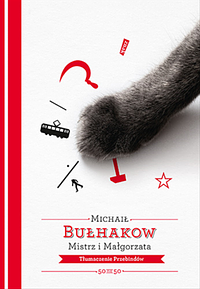Take a photo of a barcode or cover
An interesting book, but didn't captivate me. I'm not sure if the large number of characters or the pivoting perspectives made it difficult. Pilate seems to play an important role in the story but I don't perhaps understand the historical context to see at all why it's relevant to the story. Clearly important enough to take up multiple chapters, and be the core of the master's work, but I don't get it.
The book is called The Master and Margarita but you're halfway through the book before Margarita is introduced, and the master simply had a monologue in a chapter prior to this. Her role is interesting, and the chapters that follow actually have a continuous thread which provided depth that I felt was lacking up to this point.
The other thing that I kept waiting for was the clear reason this was censured for so long. On the cover is says "The daring novel which is the most talked-about literary work in Russia today"... But why? I know next to nothing of Russian history and censorship of the times, so perhaps I just and blind to the salaciousness and scandalous undertones of this book that led to it being so offensive.
The book is called The Master and Margarita but you're halfway through the book before Margarita is introduced, and the master simply had a monologue in a chapter prior to this. Her role is interesting, and the chapters that follow actually have a continuous thread which provided depth that I felt was lacking up to this point.
The other thing that I kept waiting for was the clear reason this was censured for so long. On the cover is says "The daring novel which is the most talked-about literary work in Russia today"... But why? I know next to nothing of Russian history and censorship of the times, so perhaps I just and blind to the salaciousness and scandalous undertones of this book that led to it being so offensive.
The story was really cool and hoenslty a 5 star. But I struggle reading old books and just couldn't get into it, also didn't get the overall aim of the book.
Deffo an English lit girlie book. There were some mad themes going on that just fell over my head.
But naked witch lady riding a human hog...
Deffo an English lit girlie book. There were some mad themes going on that just fell over my head.
But naked witch lady riding a human hog...
adventurous
challenging
funny
medium-paced
Plot or Character Driven:
Plot
Strong character development:
Complicated
Loveable characters:
Complicated
Diverse cast of characters:
No
Flaws of characters a main focus:
No
It took me forever to read this book due to personal reasons——and I will say my lack of knowledge of the Soviet Union and the Bible did make it hard for me to get and understand a lot of the references and themes, and combined with the long span of time it took me to finish the book I will initially give it a 3.5. However, as a literary work it was a very fun and whimsical read that left me very intrigued (and equally confused) and I would love to reread it after studying the different themes and contexts of the book.
challenging
dark
emotional
funny
hopeful
informative
inspiring
mysterious
reflective
medium-paced
Plot or Character Driven:
A mix
Strong character development:
Yes
Loveable characters:
Yes
Diverse cast of characters:
Complicated
Flaws of characters a main focus:
Yes
English review below.
—
Was zum Teufel? Der Satan höchstselbst sucht mit seinem Gefolge das Moskau der 1930er Jahre heim und richtet Chaos unter den Bürgern an. Mehr als einer landet in der Nervenheilanstalt, im Gefängnis oder auch vor dem gestrengen Gericht der Ehefrau. Meister und Margarita ist Gesellschafts- und Politsatire, Groteske, Liebesgeschichte, Märchen und, warum auch nicht, historisch-biblische Erzählung. Liegt doch nahe. Viele Zusammenhänge, Anspielungen und Allegorien kann man maximal erahnen. Zum Glück hatte meine Ausgabe gute hundert Seiten Anhänge mit Erläuterungen und Kommentierung. Klingt vielleicht ein wenig kompliziert - ich hatte aber eine Menge Spaß beim Lesen. Ich werde Meister und Margarita mit an Sicherheit grenzender Wahrscheinlichkeit nochmals lesen. Es gibt noch sehr viel mehr zu entdecken.
—
What the devil? Satan himself and his entourage descend upon 1930s Moscow and wreak havoc among its citizens. More than one person ends up in the psychiatric ward, in prison, or, even worse, facing the stern judgment of their wife. The Master and Margarita is social and political satire, grotesque, love story, fairytale and why not, historical-biblical narrative. Makes sense, doesn’t it? Many connections, allusions, allegories can only be guessed at. Fortunately, my edition had a good hundred pages of appendices with explanations and commentary. Perhaps this sounds a bit complicated - but I had a lot of fun reading it. I will almost certainly re-read The Master and Margarita. There is so much more to discover.
—
Was zum Teufel? Der Satan höchstselbst sucht mit seinem Gefolge das Moskau der 1930er Jahre heim und richtet Chaos unter den Bürgern an. Mehr als einer landet in der Nervenheilanstalt, im Gefängnis oder auch vor dem gestrengen Gericht der Ehefrau. Meister und Margarita ist Gesellschafts- und Politsatire, Groteske, Liebesgeschichte, Märchen und, warum auch nicht, historisch-biblische Erzählung. Liegt doch nahe. Viele Zusammenhänge, Anspielungen und Allegorien kann man maximal erahnen. Zum Glück hatte meine Ausgabe gute hundert Seiten Anhänge mit Erläuterungen und Kommentierung. Klingt vielleicht ein wenig kompliziert - ich hatte aber eine Menge Spaß beim Lesen. Ich werde Meister und Margarita mit an Sicherheit grenzender Wahrscheinlichkeit nochmals lesen. Es gibt noch sehr viel mehr zu entdecken.
—
What the devil? Satan himself and his entourage descend upon 1930s Moscow and wreak havoc among its citizens. More than one person ends up in the psychiatric ward, in prison, or, even worse, facing the stern judgment of their wife. The Master and Margarita is social and political satire, grotesque, love story, fairytale and why not, historical-biblical narrative. Makes sense, doesn’t it? Many connections, allusions, allegories can only be guessed at. Fortunately, my edition had a good hundred pages of appendices with explanations and commentary. Perhaps this sounds a bit complicated - but I had a lot of fun reading it. I will almost certainly re-read The Master and Margarita. There is so much more to discover.
adventurous
mysterious
reflective
medium-paced
Plot or Character Driven:
Plot
Strong character development:
Yes
Loveable characters:
Complicated
Diverse cast of characters:
Yes
Flaws of characters a main focus:
Yes
It is so good! A classic! Only wish I could read it in Russian to get the full scope of the comedy
adventurous
challenging
funny
slow-paced
Plot or Character Driven:
Plot
Strong character development:
No
Loveable characters:
No
Diverse cast of characters:
No
Flaws of characters a main focus:
Complicated
Ugh. I love Russian literature and was really hoping to love this one. After all, the novel was written between 1928 and 1940 and published posthumously in 1966-67. That alone makes it intriguing, doubly so when you know it blends satire, fantasy, romance, and philosophical musings into a sprawling narrative.
Except, that is also were it lost me. It is too sprawling, even overwrought. It’s compels structure and dense prose obscures the clarity I’ve long considered the mark of a great writer. But Bulgakov seemed to know he was writing something of cultural significance, and thus, was content to let readers wade through it all.
So while it does offer moments of dazzling insight and interest, these gems are buried in a slog that some will find frustrating. Built on a dual narrative that intertwines two distinct stories, Bulgakov set the story in 1930s Moscow and then a historical retelling of Pontius Pilate’s encounter with Yeshua Ha-Notsri (a reimagined Jesus) in Jerusalem. The latter is presented as a novel written by the titular Master.
The structure is undeniably inventive, juxtaposing the frenetic, absurd humor of Moscow with the somber, introspective Jerusalem chapters. However, Bulgakov’s ambition often overreaches, resulting in a narrative that feels cluttered and disjointed. The shifts between settings and tones can be jarring, and the novel’s non-linear digressions demand patience that not all readers will have.
Sure, the exploration of good and evil, particularly through the Pilate-Yeshua narrative, is thought-provoking, questioning moral absolutes and highlighting cowardice as a central sin. However, Bulgakov’s philosophical musings are also ponderous, buried in dense dialogue and extended metaphors that obscure their clarity. The love story between the Master and Margarita offers an emotional anchor, but even this is stretched by melodramatic flourishes that lessen its intimacy. And it is in some of these weaknesses, one wonders if it was the posthumous publication that helped it capture eventual global acclaim as opposed to true merit, as I found it a fascinating but flawed work. Count me among its critics like Steiner, Updike, and Bloom. The invention is commendable but the lack of discipline deplorable, expect for those looking for a deep dive into chaos that tickles you just enough to keep going, but just barely.
I don’t know if I have the proper words to describe or review this book. The experience of reading this I can’t put into words. Did I understand all of the references? Probably not even half. But damn does it still have such an impact.
I read this exclusively at pubs and parks in the UK. I think being slightly intoxicated is maybe the correct way to read this.
adventurous
dark
funny
mysterious
reflective
tense
slow-paced
Plot or Character Driven:
A mix
Strong character development:
Yes
Loveable characters:
Yes
Diverse cast of characters:
No
Flaws of characters a main focus:
Complicated






